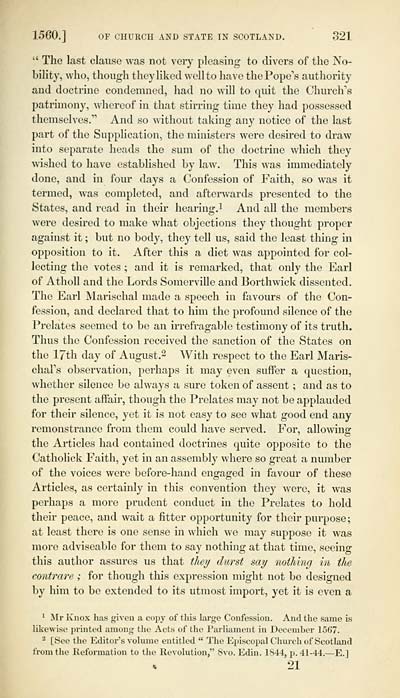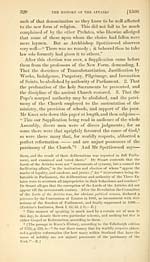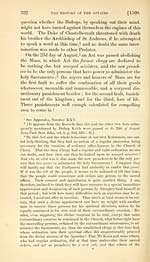Spottiswoode Society > History of the affairs of the Church and State of Scotland from the beginning of the reformation to the year 1568 > Volume 1
(457) Page 321
Download files
Complete book:
Individual page:
Thumbnail gallery: Grid view | List view

1560.] OF CHURCH AND STATE TN SCOTLAND. 321
" The last clause was not very pleasing to divers of the No-
bility, who, though they liked well to have the Pope's authority
and doctrine condemned, had no will to quit the Church's
patrimony, whereof in that stirring time they had possessed
themselves." And so without taking any notice of the last
part of the Supplication, the ministers were desired to draw
into separate heads the sum of the doctrine which they
wished to have established by law. This was immediately
done, and in four days a Confession of Faith, so was it
termed, was completed, and afterwards presented to the
States, and read in their hearing. 1 And all the members
were desired to make what objections they thought proper
against it ; but no body, they tell us, said the least thing in
opposition to it. After this a diet was appointed for col-
lecting the votes ; and it is remarked, that only the Earl
of Atholl and the Lords Somerville and Borthwick dissented.
The Earl Marischal made a speech in favours of the Con-
fession, and declared that to him the profound silence of the
Prelates seemed to be an irrefragable testimony of its truth.
Thus the Confession received the sanction of the States on
the 17th day of August. 2 With respect to the Earl Maris-
chaFs observation, perhaps it may even suffer a question,
whether silence be always a sure token of assent ; and as to
the present affair, though the Prelates may not be applauded
for their silence, yet it is not easy to see what good end any
remonstrance from them could have served. For, allowing
the Articles had contained doctrines quite opposite to the
Catholick Faith, yet in an assembly where so great a number
of the voices were before-hand engaged in favour of these
Articles, as certainly in this convention they were, it was
perhaps a more prudent conduct in the Prelates to hold
their peace, and wait a fitter oppoi'tunity for their purpose;
at least there is one sense in which we may suppose it was
more adviseable for them to say nothing at that time, seeing
this author assures us that they durst say nothing in the
contrare ; for though this expression might not be designed
by him to be extended to its utmost import, yet it is even a
1 Mr Knox has given a copy of this large Confession. And the same is
likewise printed among the Acts of the Parliament in December 1567.
2 [See the Editor's volume entitled " The Episcopal Church of Scotland
from the Reformation to the Revolution," 8vo. Edin. 1844, p. 41-44. — E.]
21
" The last clause was not very pleasing to divers of the No-
bility, who, though they liked well to have the Pope's authority
and doctrine condemned, had no will to quit the Church's
patrimony, whereof in that stirring time they had possessed
themselves." And so without taking any notice of the last
part of the Supplication, the ministers were desired to draw
into separate heads the sum of the doctrine which they
wished to have established by law. This was immediately
done, and in four days a Confession of Faith, so was it
termed, was completed, and afterwards presented to the
States, and read in their hearing. 1 And all the members
were desired to make what objections they thought proper
against it ; but no body, they tell us, said the least thing in
opposition to it. After this a diet was appointed for col-
lecting the votes ; and it is remarked, that only the Earl
of Atholl and the Lords Somerville and Borthwick dissented.
The Earl Marischal made a speech in favours of the Con-
fession, and declared that to him the profound silence of the
Prelates seemed to be an irrefragable testimony of its truth.
Thus the Confession received the sanction of the States on
the 17th day of August. 2 With respect to the Earl Maris-
chaFs observation, perhaps it may even suffer a question,
whether silence be always a sure token of assent ; and as to
the present affair, though the Prelates may not be applauded
for their silence, yet it is not easy to see what good end any
remonstrance from them could have served. For, allowing
the Articles had contained doctrines quite opposite to the
Catholick Faith, yet in an assembly where so great a number
of the voices were before-hand engaged in favour of these
Articles, as certainly in this convention they were, it was
perhaps a more prudent conduct in the Prelates to hold
their peace, and wait a fitter oppoi'tunity for their purpose;
at least there is one sense in which we may suppose it was
more adviseable for them to say nothing at that time, seeing
this author assures us that they durst say nothing in the
contrare ; for though this expression might not be designed
by him to be extended to its utmost import, yet it is even a
1 Mr Knox has given a copy of this large Confession. And the same is
likewise printed among the Acts of the Parliament in December 1567.
2 [See the Editor's volume entitled " The Episcopal Church of Scotland
from the Reformation to the Revolution," 8vo. Edin. 1844, p. 41-44. — E.]
21
Set display mode to: Large image | Transcription
Images and transcriptions on this page, including medium image downloads, may be used under the Creative Commons Attribution 4.0 International Licence unless otherwise stated. ![]()
| Permanent URL | https://digital.nls.uk/79602272 |
|---|
| Description | Volume I. |
|---|---|
| Attribution and copyright: |
|

